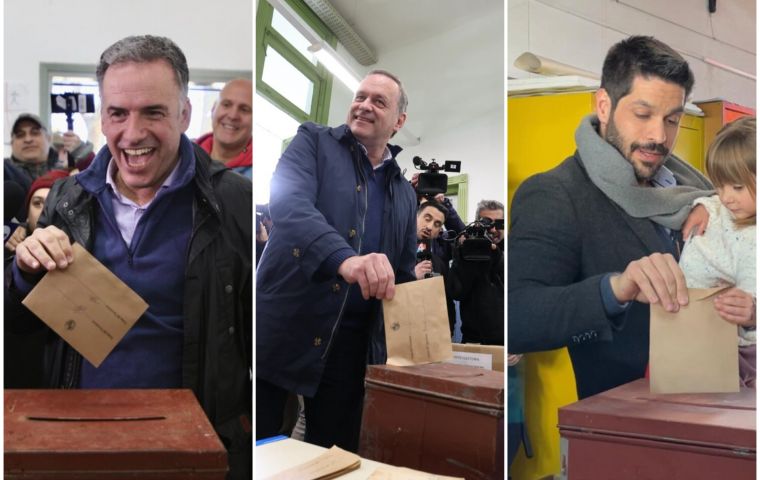MercoPress. South Atlantic News Agency
Uruguay's internal elections: Delgado, Orsi, and Ojeda to vie for Presidency
 The left-wing Frente Amplio surpassed initial expectations, while Ojeda and Delgado, as expected, became the candidates of the Partido Colorado and the Partido Nacional.
The left-wing Frente Amplio surpassed initial expectations, while Ojeda and Delgado, as expected, became the candidates of the Partido Colorado and the Partido Nacional. Uruguay's internal elections concluded yesterday, confirming Álvaro Delgado, Yamandú Orsi, and Andrés Ojeda as presidential candidates for their respective parties. The elections, held amidst a notably low turnout, saw some unexpected developments, particularly within the Frente Amplio (FA) and the Partido Nacional (PN).
Frente Amplio Surpasses Expectations
The leftist Frente Amplio exceeded initial expectations, garnering over 400,000 votes, surpassing their 2014 and 2019 results. Yamandú Orsi emerged as the dominant candidate, securing nearly 60% of the votes, with Carolina Cosse trailing at around 35%, and Andrés Lima at 3.12%. Despite a heated campaign, Orsi and Cosse appeared united on stage, signaling a commitment to party unity. “Today, the Frente Amplio started to come back,” declared Cosse, emphasizing the coalition's renewed vigor.
Orsi, in his speech, stressed the need for transparency and inclusivity, promising not to “govern for a piece of the country.” His emphasis on unity and humility was a clear message to the electorate about his leadership approach.
Partido Nacional Seeks Unity
The Partido Nacional's internal elections saw Álvaro Delgado secure a decisive victory with 74.43% of the votes. Laura Raffo followed with 19.23%, and Jorge Gandini with 5.82%. Delgado's post-election speech underscored the importance of party unity, announcing Agustín Iturralde's role in coordinating a unified campaign program. In a move that surprised many, Delgado also revealed former union leader and former Communist party member Valeria Ripoll as his running mate and President Luis Lacalle Pou's involvement in the Senate race, aiming to ensure continuity of the current government’s projects.
Partido Colorado's Transition
Andrés Ojeda, as anticipated, became the candidate for the Partido Colorado, securing 41% of the votes. Ojeda framed his victory as a symbol of political renewal and called for unity within the coalition to prevent a Frente Amplio victory in a potential runoff. “To those who tell us that it is impossible, I say the same I said in November, that statistics do not define the elections and that the games have to be played,” stated Ojeda, rallying his supporters.
Coalition Challenges
The coalition parties, including Cabildo Abierto and the Independent Party, faced significant challenges with low voter turnout. Cabildo Abierto received fewer than 16,500 votes, a steep decline from 2019's 46,887 votes. Similarly, the Independent Party, aiming to surpass 4,000 votes, managed only 2,629, indicating internal divisions and a lack of voter engagement.

Álvaro Delgado and Valeria Ripoll. Photo: FocoUy
Surprisingly, Delgado announced Valeria Ripoll as his vice-presidential candidate. Ripoll, the former general secretary of the Adeom union, is expected to attract votes from outside the traditional party base. Delgado's choice was not universally welcomed within the party, sparking some discontent among supporters of other pre-candidates. Nevertheless, Delgado's team believes Ripoll's inclusion will enhance the ticket's appeal and strengthen the party's outreach efforts.
Delgado also revealed that President Luis Lacalle Pou would join the team by integrating their lists to the Senate. This strategic decision underscores a commitment to continuity and leveraging Lacalle Pou’s influence to solidify the party's position. In his speech, Delgado emphasized the need for development, job creation, and maintaining decentralization and freedom. He called for revitalizing the government coalition and unifying the party to ensure a cohesive and effective campaign strategy leading up to the October elections. “The Partido Nacional is set to change its paradigm,” Delgado declared, highlighting a shift towards a more inclusive and progressive approach.




Top Comments
Disclaimer & comment rulesCommenting for this story is now closed.
If you have a Facebook account, become a fan and comment on our Facebook Page!